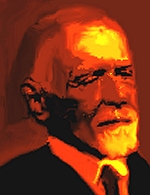|
Xtend
 Listen
Listen
 Period
Period
 Country
Country
 Quotation
Quotation
 Dictionary
Dictionary
 Projects
Projects
 Finders
Finders
|
Born: 16 December
1882, Kecskemét, Hungary
Died: 6 March 1967, Budapest, Hungary
 Kodály,
Zoltán Kodály,
Zoltán
Hungarian composer, Kodály taught himself to play different instruments, and
only later began studying music in a more orderly way. He
became Bartok's
composer, Kodály taught himself to play different instruments, and
only later began studying music in a more orderly way. He
became Bartok's friend, and together they studied and recorded Hungarian and neighbouring
regions' folk music. They traveled from village to village, notating folk
songs and dances. Eventually, they published a survey and a collection
of all the material they had gathered. Kodály wrote music that was
influenced by Debussy
friend, and together they studied and recorded Hungarian and neighbouring
regions' folk music. They traveled from village to village, notating folk
songs and dances. Eventually, they published a survey and a collection
of all the material they had gathered. Kodály wrote music that was
influenced by Debussy and Brahms
and Brahms ,
but also by the folk materials he researched. ,
but also by the folk materials he researched.
Among his important pieces, the "Hungarian
Psalm" ("Psalmus Hungaricus"),
written for the celebration of the cities Buda and Pest's unification (together
named... Budapest). The opera "Háry János"  ,
and the famous suite based on the opera, published later and made him more
famous. ,
and the famous suite based on the opera, published later and made him more
famous.
In addition to the research of folk music, Kodály
was also considered the greatest of Hungary's musical educators. He
developed a teaching methodology based on singing and the development of
musicality by means of the human voice. It was a substitute to prior
techniques, that based the teaching process mostly on playing various instruments,
like Carl Orff's technique. The "Kodály's system"
had a profound effect and became the most successful music educational
method in the western world; millions of children learn music by his system.
technique. The "Kodály's system"
had a profound effect and became the most successful music educational
method in the western world; millions of children learn music by his system.


Kodály on the WWW
 Sites
Sites
|
 Audio
Audio
|
 Video
Video
|
 Images
Images
|
 MIDI
MIDI
|
|
Description
He Was
 A teacher and music educational expert
A teacher and music educational expert
He Lived in the
 Twentieth Century
Twentieth Century
In
 Hungary
Hungary
Visit the
 Kodaly
Memorial Museum in Budapest
Kodaly
Memorial Museum in Budapest
|